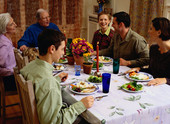
FRIDAY, July 2 (HealthDay News) — Children of mothers who favor or reject one child are more likely to suffer depressive symptoms as middle-age adults, new research suggests.
Researchers interviewed 275 Boston-area mothers in their 60s and 70s who had at least two living adult children, and 671 of the women’s children. The study authors say they are the first to show that harmful effects of a mother’s favoritism or rejection persist well into adulthood.
The findings, published recently in the Journal of Marriage and Family, could lead to new therapies.
“We have a powerful norm in our society that parents should treat kids equally, so favoritism can be something of a taboo topic,” study author Karl Pillemer, a Cornell University gerontologist, said in a university news release. “If counselors can help older parents and adult children bring some of these issues into the open, it may help prevent family conflict from arising.”
“Perceived favoritism from one’s mother still matters to a child’s psychological well-being, even if they have been living for years outside the parental home and have started families of their own,” study co-director Jill Suitor, a Purdue University sociologist, said in the news release. “It doesn’t matter whether you are the chosen child or not, the perception of unequal treatment has damaging effects for all siblings.”
More information
The U.S. National Institute of Mental Health has more about depression.

